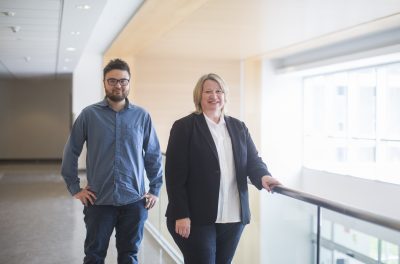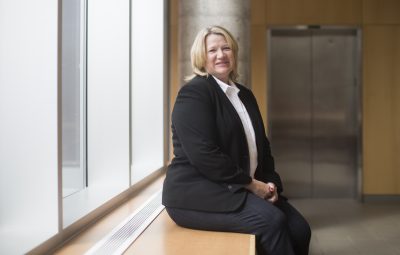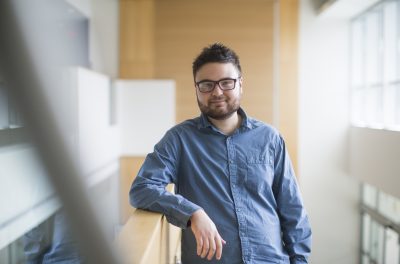Two Carleton Students Are Top of Their Class
Two Carleton graduate students, Kathy Dobson and Colin Miyata have won prestigious Vanier Scholarships. The award is worth $50,000 per year for up to three years.

“When I saw the email, I was so nervous and excited, I forgot all my passwords to access the site for a few minutes!” says Dobson. “When I read I had actually won the Vanier, I was shocked. Then I was afraid to go to bed and wake up the next morning in case it was just a dream.”
Miyata said he too was in complete disbelief when he found out. “I was very excited and shocked I had received the award.”
The award recognizes the significant value of their research.
Miyata works in Dr. Mojtaba Ahmadi’s Advanced Biomechatronics and Locomotion (ABL) laboratory at Carleton, where researchers are working on developing devices to help people learn how to walk again and prevent patient falls after a stroke, injury or accident.
With all of this research, Miyata says there is a need for safety procedures to be in place to ensure safe human-robot interaction. He is developing a process that will help.
His research will develop a sensor on the surface of a robot that will allow the robot to sense contact with the environment. When contact is detected, the robot will avoid the contact while still attempting to continue the task it was performing. Miyata notes that this response poses interesting challenges to ensure the robot does not become unstable in an environment shared with people.

Dobson’s mother, Eileen Dobson, was the inspiration behind her research and a book she wrote called With a Closed Fist (Vehicule Press, 2011).
“As a single parent on welfare, my mother fought for social justice, improved health care and education,” shares Dobson. “She was always asking whose voices are missing whenever social workers and policy-makers would talk about the cycle of poverty and insisted we needed to develop a common language when speaking about poverty and the poor.”
Says Dobson: “My book shares an insider’s view of the culture of poverty and examines the impact and ripple effect it can have on all aspects of one’s life. I believe the Vanier award means an opportunity for me to continue my mother’s work.”
Her PhD research is looking at how the poor are represented, including by social welfare and government agencies, media platforms (such as the news media and also social media) and how this can reinforce certain self-conceptions of those living in poverty.
“I think we need to stop blaming the poor for their own poverty and teach the poor to stop blaming themselves as well,” says Dobson.
“As a mother of five children, three of whom are still dependent on me, the Vanier means extra funds to devote specifically to my research and also allows me to reimagine my research on a larger scale, so that I can work more intimately with community members and hope to make more of a difference.”
Miyata completed his undergraduate degree in Biomedical and Mechanical Engineering in the Faculty of Engineering and Design at Carleton and was awarded the Chancellor’s Medal. He continued at Carleton, focusing on biomedical engineering for his master’s degree.
“During my time at Carleton, I have had many opportunities to research a wide variety of biomedical engineering applications including implant materials, assistive devices, crash test dummy instrumentation and robotics,” says Miyata.
He got married in June to another Carleton student who recently graduated from Carleton with a BA in Arts (Psychology). “The Vanier funding will go a long way to setting us up for this next stage of our lives.”

Miyata is now pursuing his PhD in Mechanical Engineering at Carleton.
“The program offers many interesting courses and encourages diversity in your studies,” says Miyata. “More importantly, the faculty offers many resources to researchers, including lab facilities and a machine shop with an excellent technician, the opportunity to collaborate with researchers in diverse fields and the means to share your work both in seminars and with bursaries to travel to conferences.”
His plans include continued supervision by Prof. Ahmadi. “He genuinely enjoys research and seeks to foster the same enthusiasm in his students, offering them choices in their research projects and as much independence as they want in searching for solutions in their studies. However, if students do get stuck, he always offers suggestions and guidance based on his expertise in the field.”
Dobson grew up in Point St. Charles in Montreal, then described by the National Film Board as the `‘toughest neighbourhood in Canada.” Although Dobson grew up on welfare and dropped out of high school at the age of 15, she did eventually go back to school and complete a BA at Waterloo and a Master’s in Communication Studies at Wilfrid Laurier. After working as a journalist for 20 years, she is now pursuing a PhD in Communication at Carleton.
She says that her department is very multidisciplinary, with faculty members and students working with a very broad range of research interests and approaches. “The entire department is incredibly supportive of all of its students, with regular workshops and meetings to help with (for example) grant applications, research and writing.”
Her thesis adviser is Dr. Sheryl Hamilton. “In addition to her expertise, Sheryl is an incredibly supportive, involved supervisor whose advice and guidance has helped me throughout the first year of my PhD. She’s actually one of the main reasons why I came to Carleton…She has guided me towards a more nuanced project that considers the larger picture.”
In addition to their Vanier awards, Dobson has also been offered a Joseph-Armand Bombardier Canada Graduate Scholarship and an Ontario Graduate Scholarship, while Miyata has been offered an Alexander Graham Bell Canada Graduate Scholarship.